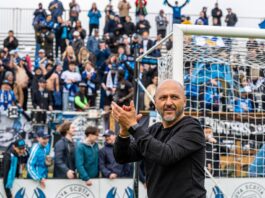Toni Bilandžić is a Croatian football recruitment specialist and Head of Recruitment and Scouting at FK Sarajevo, known for his structured approach to talent identification, squad-building strategy and using different scouting techniques for informed decisions. Born and raised in Osijek, Toni holds a Master’s degree in Economics and has worked across multiple European clubs in various scouting and analysis capacities, quickly building a reputation for combining technical insight with operational efficiency.
His journey began in video analysis at NK Osijek B, where he focused heavily on individual development and opponent scouting. He then joined Vålerenga IF in Norway, where he progressed from Technical Scout to Chief Scout. During his time there, he not only built data-backed scouting systems but also mentored aspiring analysts through internship programs, helping several secure full-time roles across Europe. His work involved detailed video and data analysis, squad planning, and direct communication with agents and club leadership.
In April 2024, Toni took on the role of Head of Recruitment and Scouting at FK Sarajevo, where he built the department from the ground up. He currently oversees all recruitment operations, scouting workflows, and player evaluations. Toni brings a modern, analytical lens to football recruitment, working closely with coaches and boards to align recruitment with club objectives. The first season was a big success with the club making noticeable growth in giving young players a chance, but also because the club won its first trophy after 3 seasons being trophyless.
Beyond club work, Toni has contributed written scouting reports and analysis for Total Football Analysis and served as a video scout for Vélez CF, showing his commitment to continuous learning and knowledge sharing. Fluent in Croatian and English, and currently expanding his language skills in French, Toni is part of a new generation of forward-thinking football professionals shaping the game through data, detail, and development.
Our Exclusive Interview with Toni Bilandžić
Who is Toni Bilandžić beyond football? How would you describe yourself outside your professional work?
I’d say I’m just an ordinary guy who enjoys spending time with my girlfriend, family, and friends. What makes me especially happy is gathering loved ones for a barbecue, something I really enjoy. Lately, I’ve been reading a lot of books, which didn’t interest me much during school, but I can read a lot when the topic is football or self-improvement.
You’ve built scouting departments from scratch and mentored scouts into full-time roles. What do you believe makes an effective modern scouting structure?
It’s been a good challenge, especially since I joined FK Sarajevo, as the club was handling most of its recruitment in a traditional way. What’s important is having a quality database and a platform where all reports and notes are stored in one place. That way, you can organize scouting effectively and access any report or information with just a few clicks, which is crucial given the volume of information we receive daily. It’s also essential that scouts have clear guidelines on how to report and understand the club’s expectations and their responsibilities.
When it comes to mentoring scouts, I’ve noticed in recent years that many internships are more focused on the club offering the internship than on the intern. An internship should serve as a valuable experience, helping aspiring scouts learn how to operate in a professional environment and receive consistent feedback, which is key to their development. What many clubs miss is providing that feedback. Interns often submit reports and input but rarely get value in return for the time they invest in watching games and creating reports. All the interns we had at Vålerenga can confirm that they were never pressured to watch a set number of matches or produce a specific number of reports. The more time they invested, the more time I invested in giving them meaningful feedback. I’m proud that many of them now work at clubs, either part-time or full-time.
Having worked in the Croatian, Bosnian and Norwegian football systems, how do you compare the recruitment cultures and player development approaches in each?
Recruitment cultures differ across countries. In Norway, there is a strong focus on signing young players with resale value, while also maintaining a high number of domestic players for quicker adaptation. For example, players from Africa often adapt well in Norway due to the country’s inclusive environment. In Croatia and Bosnia, what bothers me most is the tendency toward low-risk decisions. Clubs often prefer signing older players from other teams rather than giving chances to their own youth or bringing in promising young talent.
I see this as a cultural mindset. In the Balkans, people are very competitive and tend to choose players who can help win the next match over younger players who, with a bit of patience and development, could become key contributors within a few months. This is true across both top and bottom half teams. While there are exceptions, the general mentality is similar among clubs and fans. Many fans would rather welcome a well-known player past his prime and call it a “great move” than support an under-the-radar signing before the player even steps onto the pitch.
One thing I admire in Norway is the role of the transition or development coach, originally funded by the FA, where each club employs a coach dedicated solely to player development. This helps accelerate individual growth by focusing on specific weaknesses. At FK Sarajevo, we introduced a similar role, which allows us to target areas of improvement and better prepare players for senior football. When I was at Osijek B as an analyst, I worked closely with our most talented players through one-on-one video analysis and provided input to coaches on the specific skills those players needed to develop in training.
At FK Sarajevo, you’re leading the recruitment strategy and talent identification. What’s your approach to balancing data, video analysis, and live scouting in decision-making?
We use video analysis most of the time because it’s cost-effective and there is an abundance of footage available today. If you do detailed work and watch enough matches, you’ll rarely see something completely new by watching the player live. Still, seeing a player in person is useful when possible, as it helps confirm the full evaluation process before making a signing. When the opportunity arises, especially within our target market in the Balkans, we make an effort to watch players live.
We also scout in Africa and last year visited five countries in West Africa, attending eight different scouting tournaments. I broke into football through data storytelling, as I’ve always been able to interpret numbers in a way that makes sense even to those who aren’t data-oriented. I’ve never used data as an exclusive tool. Instead, we use it as a first filter to identify interesting players in certain leagues. From there, we monitor them more closely through video, and finally, we use data to support the decision-making process. It gives us valuable context, but it’s never the sole factor in whether we sign a player.
You’ve used platforms like Wyscout, MetricaPlay, and Tableau extensively. How important is technology and data literacy for today’s scouting professionals?
It’s just part of my journey. In my current role, I mostly use Wyscout, but in previous positions, I had to be familiar with various tools for analysis, data visualization, or creating video reports. These tools are essential for working efficiently. Football is a fast-paced and often chaotic environment, where things can change quickly, and you may be asked by a sporting director or head coach to deliver something on short notice. These tools help you stay sharp and respond quickly.
I remember my time at Total Football Analysis, where I spent hours building dashboards to visualize player data profiles or identify interesting players using scatter plots. Nowadays, I mostly use those tools for squad depth planning. I have templates saved and simply update the inputs based on any changes that occur.
Looking ahead, what are your long-term goals in football, and how do you see the role of recruitment evolving in the next decade?
Since I recently agreed with the club to expand my role and take on assistant sporting director duties, I’m now focused on developing myself further with the goal of becoming a sporting director in the future. There is still plenty of room for me to grow, and I’m committed to improving every day to eventually reach that position. Recruitment needs to evolve significantly, especially with more clubs now using AI platforms to support their scouting processes. I hope smaller clubs also begin to realize that staying competitive with wealthier teams requires proactive thinking and a willingness to embrace modern approaches by hiring ambitious and knowledgeable professionals.




